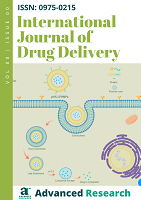Efficacy and duration of analgesia from a sustained-release lidocaine sheet in humans
Keywords:
sustained-release lidocaine, 8% lidocaine spray, biodegradable polymer, healthy volunteer, clinical trial, postoperative analgesiaAbstract
We have synthesized a sustained-release lidocaine sheet (SRLS) and injectable sustained-release lidocaine particles (SRLP) using biodegradable polymers. In the present study, we performed an exploratory first clinical trial of the SRLS in healthy volunteers as a prelude to patient administration. This trial is meant as an initial intervention in ultimately developing and refining the SRLP. We evaluated the intensity and duration of analgesia of the SRLS compared with 8% lidocaine spray. In Protocol 1, we applied the SRLS piece to the mucous membrane of the nasal vestibule. We examined the local pain threshold over 72 h after administration, and removed the SRLS after 72 h. Individuals that finished Protocol 1 underwent Protocol 2, in which we applied 8% lidocaine spray. Twelve volunteers were enrolled and seven of these volunteers finished Protocol 1. All seven individuals who completed Protocol 1 also completed Protocol 2. The mean pain thresholds were 32 g, 78 g, 90 g, 90 g, 87 g, and 87 g at pre-administration and 4 h, 10 h, 24 h, 48 h, and 72 h after administration, respectively, in Protocol 1, and 36 g, 85 g, 49 g, and 33 g at pre-administration and 15 min, 2 h, and 4 h, respectively, in Protocol 2. A sustained-release lidocaine using biodegradable polymers was applied as a sheet in humans for the first time in the world. It maintained significant analgesia for 72 h without major toxicities. Furthermore, degree of analgesia provided by the SRLS throughout the entire study was similar to that provided by the 8% lidocaine spray. It may suitable for management of postoperative pain especially in outpatients.
References
Crews JC. Epidural opioid analgesia. Crit Care Clin. 1990 ; 6 (2): 315-42.
Carli F, Mayo N, Klubien K, Schricker T, Trudel J, Belliveau P. Epidural analgesia enhances functional exercise capacity and health-related quality of life after colonic surgery: results of a randomized trial. Anesthesiology 2002 ; 97 (3): 540-9
Liu S, Carpenter RL, Neal JM. Epidural anesthesia and analgesia. Their role in postoperative outcome. Anesthesiology 1995 ; 82 (6): 1474-506
Liu SS, Wu CL. Effect of postoperative analgesia on major postoperative complications: a systematic update of the evidence. Anesth Analg 2007; 104 (3): 689-702
Macrae WA. Chronic post-surgical pain: 10 years on. Br J Anaesth 2008; 101 (1): 77-86
http://bja.oxfordjournals.org/content/101/1/77.long
Kehlet H, Jensen TS, Woolf CJ. Persistent postsurgical pain: risk factors and prevention. Lancet 2006; 367 (9522): 1618-25
http://www.sciencedirect.com/science/article/pii/S014067360668700X
Ratajczak-Enselme M, Estebe JP, Dollo G, Chevanne F, Bec D, Malinovsky JM, Ecoffey C, Le Corre P. Epidural, intrathecal and plasma pharmacokinetic study of epidural ropivacaine in PLGA-microspheres in sheep model. Eur J Pharm Biopharm 2009; 72 (1): 54-61
http://www.sciencedirect.com/science/article/pii/S0939641108004487
Yin QQ, Wu L, Gou ML, Qian ZY, Zhang WS, Liu J. Long-lasting infiltration anaesthesia by lidocaine-loaded biodegradable nanoparticles in hydrogel in rats. Acta Anaesthesiol Scand 2009; 53 (9): 1207-13
http://onlinelibrary.wiley.com/doi/10.1111/j.1399-6576.2009.02030.x/full
Chen PC, Park YJ, Chang LC, Kohane DS, Bartlett RH, Langer R, Yang VC. Injectable microparticle-gel system for prolonged and localized lidocaine release. I. In vitro characterization. J Biomed Mater Res A 2004; 70 (3): 412-9
http://onlinelibrary.wiley.com/doi/10.1002/jbm.a.30086/full
Sokolsky-Papkov M, Golovanevski L, Domb AJ, Weiniger CF. Poly (DL:lactic acid-castor oil) 3: 7- bupivacaine formulation: reducing burst effect prolongs efficacy in vivo. J Pharm Sci 2010; 99 (6): 2732-8
http://onlinelibrary.wiley.com/doi/10.1002/jps.22025/full
Garry MG, Jackson DL, Geier HE, Southam M, Hargreaves KM. Evaluation of the efficacy of a bioerodible bupivacaine polymer system on antinociception and inflammatory mediator release. Pain 1999; 82 (1): 49-55
http://dx.doi.org/10.1016/S0304-3959(99)00032-9
Malinovsky JM, Le Corre P, Meunier JF, Chevanne F, Pinaud M, Leverge R, Legros F. A dose–response study of epidural liposomal bupivacaine in rabbits. J Control Release 1999; 60 (1): 111-9
http://dx.doi.org/10.1016/S0168-3659(99)00062-0
Boogaerts JG, Lafont ND, Declercq AG, Luo HC, Gravet ET, Bianchi JA, Legros FJ. Epidural administration of liposome-associated bupivacaine for the management of postsurgical pain: a first study. J Clin Anesth 1994; 6 (4): 315-20
http://dx.doi.org/10.1016/0952-8180(94)90079-5
Ohri R, Wang JC, Blaskovich PD, Pham LN, Costa DS, Nichols GA, Hildebrand WP, Scarborough NL, Herman CJ, Strichartz GR. Inhibition by local bupivacaine-releasing microspheres of acute postoperative pain from hairy skin incision. Anesth Analg. 2013; 117(3): 717-30
Grant GJ, Lax J, Susser L, Zakowski M, Weissman TE, Turndorf H. Wound infiltration with liposomal bupivacaine prolongs analgesia in rats. Acta Anaesthesiol Scand 1997; 41 (2): 204-7
Dräger C, Benziger D, Gao F, Berde CB. Prolonged intercostal nerve blockade in sheep using controlled-release of bupivacaine and dexamethasone from polymer microspheres. Anesthesiology 1998; 89 (4): 969-79
Suto T, Obata H, Tobe M, Oku H, Yokoo H, Nakazato Y, Saito S. Long-term effect of epidural injection with sustained-release lidocaine particles in a rat model of postoperative pain. Br J Anaesth. 2012 Dec; 109 (6): 957-67
http://bja.oxfordjournals.org/content/109/6/957.long
Bramlett K, Onel E, Viscusi ER, Jones K. A randomized, double-blind, dose-ranging study comparing wound infiltration of DepoFoam bupivacaine, an extended-release liposomal bupivacaine, to bupivacaine HCl for postsurgical analgesia in total knee arthroplasty. Knee. 2012; 19 (5): 530-6
http://dx.doi.org/10.1016/j.knee.2011.12.004
Smoot JD, Bergese SD, Onel E, Williams HT, Hedden W. The efficacy and safety of DepoFoam bupivacaine in patients undergoing bilateral, cosmetic, submuscular augmentation mammaplasty: a randomized, double-blind, active-control study. Aesthet Surg J. 2012; 32 (1): 69-76
http://aes.sagepub.com/content/32/1/69.long
Golf M, Daniels SE, Onel E. A phase 3, randomized, placebo-controlled trial of DepoFoam® bupivacaine (extended-release bupivacaine local analgesic) in bunionectomy. Adv Ther. 2011; 28 (9): 776-88
Go¨rner T, Gref R, Michenot D, Sommer F, Tran MN, Dellacherie E. Lidocaine-loaded biodegradable nanospheres. I. Optimization of the drug incorporation into the polymer matrix. J Control Release 1999; 57 (3): 259-68
http://dx.doi.org/10.1016/S0168-3659(98)00121-7
Ricci EJ, Lunardi LO, Nanclares DM, Marchetti JM. Sustained release of lidocaine from Poloxamer 407 gels. Int J Pharm 2005; 288 (2): 235-44
http://dx.doi.org/10.1016/j.ijpharm.2004.09.028
Wang CF, Djalali AG, Gandhi A, Knaack D, De Girolami U, Strichartz G, Gerner P. An absorbable local anesthetic matrix provides several days of functional sciatic nerve blockade. Anesth Analg 2009; 108 (3): 1027-33
Paavola A, Yliruusi J, Kajimoto Y, Kalso E, Wahlstro¨m T, Rosenberg P. Controlled release of lidocaine from injectable gels and efficacy in rat sciatic nerve block. Pharm Res 1995; 12 (12): 1997-2002
Chen PC, Kohane DS, Park YJ, Bartlett RH, Langer R, Yang VC. Injectable microparticle-gel system for prolonged and localized lidocaine release. II. In vivo a nesthetic effects. J Biomed Mater Res A 2004; 70 (3): 459-66
http://onlinelibrary.wiley.com/doi/10.1002/jbm.a.30101/full
Sato S, Baba Y, Tajima K, et al. Prolongation of epidural anesthesia in the rabbit with the use of a biodegradable copolymer paste containing lidocaine. Anesth Analg 1995; 80 (1): 97-101
Mashimo T, Uchida I, Pak M, Shibata A, Nishimura S, Inagaki Y, Yoshiya I. Prolongation of canine epidural anesthesia by liposome encapsulation of lidocaine. Anesth Analg 1992; 74 (6): 827-34
Yin QQ, Wu L, Gou ML, Qian ZY, Zhang WS, Liu J. Long-lasting infiltration anaesthesia by lidocaine-loaded biodegradable nanoparticles in hydrogel in rats. Acta Anaesthesiol Scand 2009; 53 (9): 1207-13
http://onlinelibrary.wiley.com/doi/10.1111/j.1399-6576.2009.02030.x/full
Tobe M, Obata H, Suto T, Yokoo H, Nakazato Y, Tabata Y, Saito S. Long-term effect of sciatic nerve block with slow-release lidocaine in a rat model of postoperative pain. Anesthesiology 2010; 112 (6): 1473-81
Kanda Y. Investigation of the freely available easy-to-use software 'EZR' for medical statistics. Bone Marrow Transplant. 2013; 48 (3): 452-8
http://www.ncbi.nlm.nih.gov/pmc/articles/PMC3590441/
http://www.nature.com/bmt/journal/v48/n3/full/bmt2012244a.html





